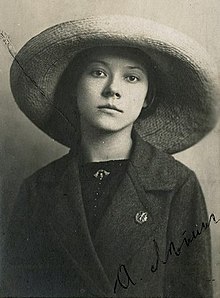Asja Lācis
This article includes a list of general references, but it lacks sufficient corresponding inline citations. (May 2022) |
Asja Lācis | |
|---|---|
 | |
| Born | Anna Liepiņa 19 October 1891 Līgatne, Governorate of Livonia, Russian Empire |
| Died | 21 November 1979 Riga, Latvian SSR, Soviet Union |
| Occupation | Actress, theatre director, writer |
| Genre | Epic theatre |
| Spouse | Jūlijs Lācis, Bernard Reich |
Anna "Asja" Lācis (née Liepiņa; Russian: Анна 'Ася' Эрнестовна Лацис, Anna 'Asya' Ernestovna Latsis; German: Asja Lazis; October 19, 1891 – November 21, 1979) was a Latvian actress and theatre director.
Biography
[edit]She was born in to the family of a factory worker. A Bolshevik, in the twenties she became famous for her proletarian theatre troupes for children and agitprop in Soviet Russia and Latvia. She believed that children's theater could be used as the cornerstone for the children's general education, which was especially important with poor, proletarian children who often had little or no other educational opportunities.[1]
In 1922 she moved to Germany where she got to know Bertolt Brecht and Erwin Piscator, to whom she introduced the ideas of Vsevolod Meyerhold and Vladimir Mayakovsky.
In 1924 she met the German philosopher and critic Walter Benjamin in Capri, and the duo would have an intermittent affair for the next several years as he visited her in Moscow and Riga. She has been cited as a factor in Benjamin's embracing Marxism.[2] In 1928, Benjamin dedicated a collection of essays to her.[3]
In 1938 during Stalin's Great Purge she was deported to Siberia. Lācis was released and returned to Soviet Latvia in 1948[3] and spent her old age together with her husband, the German theatre critic Bernhard Reich. From 1948 to 1957 she was the main director of Valmiera Drama Theatre and used the leftist avant-garde technics in her stage productions.[4]
Lācis' granddaughter is the acclaimed Latvian theatre director Māra Ķimele.
References
[edit]- ^ Signals from Another World: Proletarian Theater as a Site for Education Texts by Asja Lācis and Walter Benjamin, with an introduction by Andris Brinkmanis, South
- ^ Mark Lilla, "The Riddle of Walter Benjamin" in The New York Review of Books, May 25, 1995
- ^ a b National Library to recount the fabulous story of Latvian pioneer of the avant-garde. Public Broadcasting of Latvia. January 17, 2018
- ^ "Sākuma lapa". Līgatne. Retrieved 2024-10-16.
Sources
[edit]- Ingram, Susan (2002). "The Writing of Asja Lacis". New German Critique. 86 (86): 159–177. doi:10.2307/3115205. JSTOR 3115205.
- Latsis, Anna (1984). Krasnaia gvozdika: Vospominaniia (in Russian). Riga: Liesma. OCLC 13003307.(memoirs)
- Ķimele, Dagmāra and Strautmane, Gunta. Asja: režisores Annas Lāces dēkainā dzīve [Asja: The Stormy Life of the director Anna Lāce]. Riga: Likteņstāsti, 1996.
- Asja Lacis, Revolutionär in Beruf: Berichte über proletarisches Theater, über Meyerhold, Brecht, Benjamin und Piscator. München: Rogner & Bernhard, 1971.
